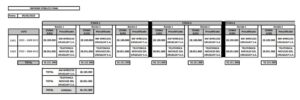

Geusseppe Gonzalez
Public Sector


Rodrigo Serrallonga Mejía
Artificial Intelligence


Read this Access Alert in Spanish | Lea este Access Alert en Español
Several Latin American countries have made significant progress towards increasing connectivity. Developments include the allocation of spectrum for 4G and 5G, as well as connectivity plans. We have closely monitored developments in Guatemala, Perú, Uruguay, and Bolivia.
After weeks of controversy and discussions about the terms of the auction, Uruguay successfully assigned one block of 100 MHz to each of the incumbent operators that qualified for the contest. As a result, America Móvil Wireless Uruguay (3,300-3,400 MHz) and Telefónica Móviles Uruguay (3,700-3,800 MHz) can now offer commercial 5G services in the country. As addressed here, Entel already had a block reserved, meaning all three main MNO will now begin a new era of mobile services. This will likely increase competition and connectivity offerings.
As presented in the official final report, bids barely increased the reserve price of USD 28 million (28.1 and 28.05 million, respectively). This means Entel would have to pay a similar value for the reserved block because the rules defined that the price would be the average of the final bids.


After several delays to the process, the Superintendency of Telecommunications announced the auction of spectrum for mobile services and highlighted that 75% of the money will go towards increasing digital connectivity throughout the country.
The bands on offer comprise blocks in the 2,500-2,550 MHz segment (50 MHz @ 2.5 GHz) and 2,604.25-2,680.5 MHz (70 MHz @ 2.6 GHz), totalling 120 MHz of spectrum.
The timeline is tight. Interested companies have until 15 May to acquire the auction rules. SIT will then receive comments until 26 May so that the auction can be held on 2 June.
The auction is part of the Digital Connectivity National Plan and aims to increase the quality and coverage of mobile broadband services while increasing adoption of digital technologies.
Perú recently updated its channelling plans for telecommunication services. Through vice-ministerial Resolution 056-2023-MTC/26, the Ministry of Transport and Communications defined the technical specifications for the use of radio spectrum, including the channelling of IMT bands for 4G and 5G.
As stated by the ministry, the new channelling plan will promote innovation and investment in telecommunications, increasing the amount of available spectrum for mobile and fixed services. One of the key highlights of the new regulation is the inclusion of bands such as 3.5 GHz and millimetre waves (mmW), which are intended to be used for 5G networks, as well as lower bands, including 1.7 GHz, 2.1 GHz, and 2.6 GHz.
As a result, additional spectrum is expected to be put into the market, particularly for 5G networks. However, no clear timeline for a possible auction has been set.
During the commemoration of the 15 years of Entel, Bolivian president Luis Arce Catacora announced that the state-owned company is preparing for the commercialisation of 5G services in the country. During a public event, the president highlighted that Entel’s operations have been successful in achieving connectivity while recognising that 5G investments are to be defined carefully to ensure they remain competitive.
In addition, President Arce underscored that there are more than 6 million users of mobile services located in 20,100 localities, served by more than 10,200 base stations. 33.200km of fibre optic has been deployed throughout the country.
Promoting 5G connectivity is still one of the main priorities for Latin American countries. Recent developments demonstrate that there is a persistent interest from regulators across the region to provide more certainty over investments and access to spectrum. As such, growing enthusiasm over the 3.5 GHz band ratifies that, for now at least, this is the most important band regionally for 5G rollouts. On the other hand, not many jurisdictions have assigned mmW bands, meaning questions remain regarding the business opportunities for those frequencies.
With Uruguay’s successful auction, and despite the usual controversy, there is growing evidence that Latin American markets are willing to invest in the right frequency bands. Against this backdrop, future auctions in Perú and Colombia may need to consider how much the market is willing to invest when offered several bands. The Uruguayan approach showcases a pragmatic 5G-only approach that will likely boost investment in 5G while relieving pressure from assigning 5G bands, allowing for a different strategy in terms of sub-3 GHz bands.
In sum, spectrum auctions are a hot topic still on the horizon. With each auction, there is an opportunity for regulators and industry to improve quality, coverage, and digital inclusion while fostering the adoption of new technologies. The regional 5G plans are progressing, with additional developments expected in H2. These include the biggest spectrum auction in Colombia’s history.
Access Partnership continuously monitors public policy and regulatory developments in Latin America. For more information about our services, please contact Geusseppe Gonzalez at [email protected] and Rodrigo Serrallonga at [email protected].



